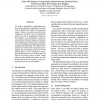Free Online Productivity Tools
i2Speak
i2Symbol
i2OCR
iTex2Img
iWeb2Print
iWeb2Shot
i2Type
iPdf2Split
iPdf2Merge
i2Bopomofo
i2Arabic
i2Style
i2Image
i2PDF
iLatex2Rtf
Sci2ools
127
Voted
EMNLP
2010
2010
A Probabilistic Morphological Analyzer for Syriac
We define a probabilistic morphological analyzer using a data-driven approach for Syriac in order to facilitate the creation of an annotated corpus. Syriac is an under-resourced Semitic language for which there are no available language tools such as morphological analyzers. We introduce novel probabilistic models for segmentation, dictionary linkage, and morphological tagging and connect them in a pipeline to create a probabilistic morphological analyzer requiring only labeled data. We explore the performance of models with varying amounts of training data and find that with about 34,500 labeled tokens, we can outperform a reasonable baseline trained on over 99,000 tokens and achieve an accuracy of just over 80%. When trained on all available training data, our joint model achieves 86.47% accuracy, a 29.7% reduction in error rate over the baseline.
EMNLP 2010 | Morphological Analyzer | Natural Language Processing | Probabilistic Morphological Analyzer | Training Data |
Related Content
| Added | 11 Feb 2011 |
| Updated | 11 Feb 2011 |
| Type | Journal |
| Year | 2010 |
| Where | EMNLP |
| Authors | Peter McClanahan, George Busby, Robbie Haertel, Kristian Heal, Deryle Lonsdale, Kevin D. Seppi, Eric K. Ringger |
Comments (0)

